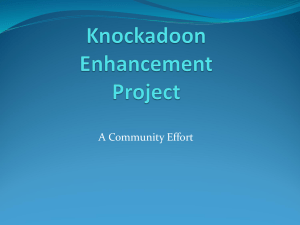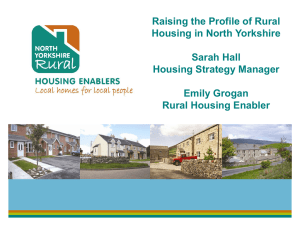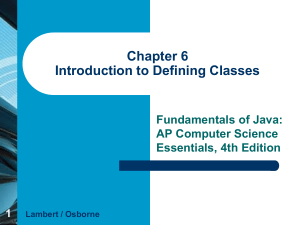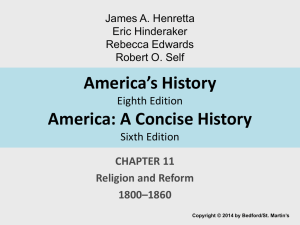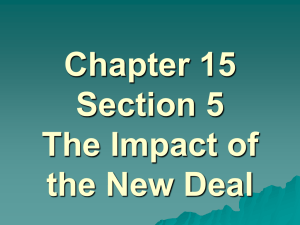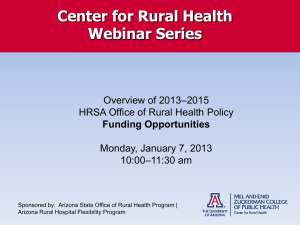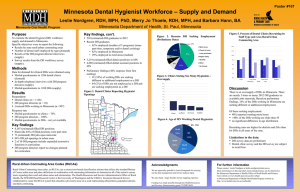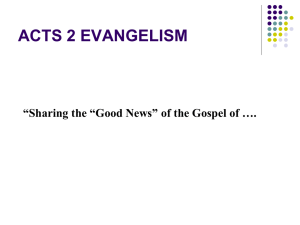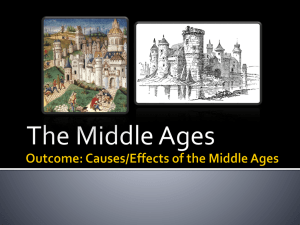Good News in the Countryside Nov 2013
advertisement
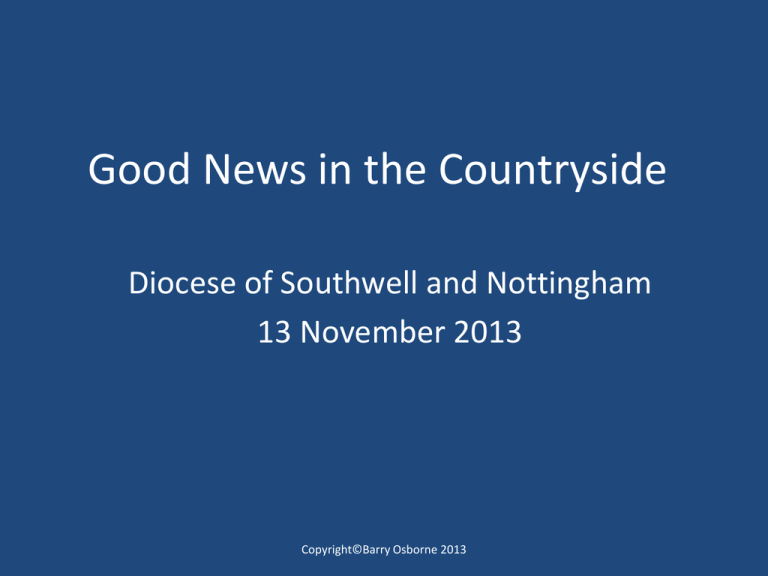
Good News in the Countryside Diocese of Southwell and Nottingham 13 November 2013 Copyright©Barry Osborne 2013 Special Information This presentation was designed and written by the Rev’d Barry Osborne. It is hoped that many will find it helpful. Should you make use of the presentation we ask that you include the contact information towards the end of the presentation. Much of the clipart is in the public domain. The origin of the cartoon on slide 44 is unknown. Should you wish to use any of the material in the presentation please obtain permission stating what you wish to use and how you intend to use it. A presentation transcription can be made available. Thank you. Copyright©Barry Osborne 2013 Rural Evangelism Network Ecumenical Members are the Churches and Mission Agencies Sharing insight and experience Encouraging good practice Conferences Publications Consultations Interactive Website www.ruralmissions.org.uk Copyright©Barry Osborne 2013 A bit about your speaker • 1965 to 1988 full time rural missioner – Ecumenical special missions – Training men and women for rural ministry • 1968 first pastorate – in Hastings, East Sussex • 1982 helped to set up the Rural Evangelism Network • 1988 established ‘Rural Sunrise’ • 1990 to 2005 second pastorate – Herstmonceux • 2005 moved to East Midlands Copyright©Barry Osborne 2013 A bit more about your speaker • • • • • • • Third pastorate – Yelvertoft, Northants. Researching rural mission Networking – nationally and locally Rural Mission Consultations Tailoring Mission Strategy Church Away-Days Special events – “songs and stories” Copyright©Barry Osborne 2013 What does “rural” mean today? Copyright©Barry Osborne 2013 Most of the land area of the UK is rural. Approximately 90%. Copyright©Barry Osborne 2013 Rural Britain: Home to 10,000,000 people Copyright©Barry Osborne 2013 One in Six People live in the rural areas Copyright©Barry Osborne 2013 Rural Britain: Probably Over 20,000 settlements Copyright©Barry Osborne 2013 Population • Approximately 10.4% of Britain’s population live in discrete communities of 1000 or less. • A further 1.4% live in communities between 1,000 to 2,000 • A further 5% live in communities from 2,000 to 5,000 • Rural population is growing Data Source: Consultation with Office for National Statistics Copyright©Barry Osborne 2013 Small and scattered Copyright©Barry Osborne 2013 The proximity model Rt. Rev’d Dr. Anthony Russell The further people live from a conurbation the more distinctly different their way of life Urban conurbation Less accessible countryside Urban shadow Remote Countryside Accessible countryside Copyright©Barry Osborne 2013 Current or historic economic factors also form the life of the community Agricultural Industrial Commuter Fishing Leisure Copyright©Barry Osborne 2013 Village life affected by … Size and morphology Proximity to larger towns Socio-economic history Degree of incomer influence Copyright©Barry Osborne 2013 Villages vary considerably and are made up of people from a wide range of social groups with different agendas. Copyright©Barry Osborne 2013 Who lives in rural Britain? • Indigenous villagers • Professional people • Historic land owners • Movers and shakers • New land owners • Farmers etc • Retired people • “The Good Life” people • Suburban commuters Second Home owners Copyright©Barry Osborne 2013 Rural communities are unique, complex combinations of various factors Copyright©Barry Osborne 2013 Nottinghamshire facts Population 748,510 18% of the population are under 16 18% of the population are over 65 Copyright©Barry Osborne 2013 Nottinghamshire facts Classification Urban >10,000 Town & fringe Village Hamlet & isolated Percentage 71% 18% 9% 2% Copyright©Barry Osborne 2013 Some interesting facts • Most people in rural Britain are not indigenous • Moving to the countryside is a life-style choice (where does religion fit in?) • Rural societies are complex and sophisticated • Most of the UK’s most influential people live in rural areas • Rural communities are becoming suburbanised Copyright©Barry Osborne 2013 Characteristics and behaviour patterns that can develop in small communities • Cautious • Intransigent • Conservative • Diffident • Insular • As a community • Suspicion A complex network of social interaction Copyright©Barry Osborne 2013 What defines rural culture? • • • • • • 50 years ago Strong links between the people and the place. Limits to mobility Self contained Parochial mindset Limited experience Low expectations • • • • • • Today Incomers and suburbanisation Physical & social mobility Global access Satellite communities Wide experience High expectation Copyright©Barry Osborne 2013 What defines rural culture? 50 Years ago you lived there because… It was “your world” It was where you worked You were landed gentry Today indigenous villagers are in decline It is a place for a better lifestyle and an up-market lifestyle It is also a place of leisure Copyright©Barry Osborne 2013 Rural Spirituality 50 years ago • Going to church was normal • Non-conformity was strong • Non-Christian beliefs/practices were seen as weird • There was either inherited traditions or inherited traditions • Faith was demonstrated and measured by commitment to the institutional structures Copyright©Barry Osborne 2013 Rural Spirituality Today • The Church belongs to us - if we need it • Church is seen as non-essential to faith • Marginal and hybrid forms of faith are praiseworthy – only traditional Christians are weird! • Faith is no longer tied to scripture • You cannot evaluate or judge customised faith systems. Absolutely no absolutes! Copyright©Barry Osborne 2013 The State of the Rural Churches Copyright©Barry Osborne 2013 What churches are present in rural England? • 63% Church of England • 26% Methodist • 5% Baptist • 3% URC and Continuing Congregational • 3% Others Copyright©Barry Osborne 2013 Closed places of worship Methodist sold approx. 3,000 church buildings 1963-1973. URC sold 10% of buildings soon after formation in 1972. Copyright©Barry Osborne 2013 Rural Churches • Past declining attendance • Multi-parish benefices • Reduction in regular services • Loss of thousands of non-conformist churches • Maintenance burden • Ecumenical relationships • Commuting to worship Copyright©Barry Osborne 2013 Worship Issues • Tangerines are not small oranges • Making worship style and contents culturally relevant • Quality leadership in ministry? • Disaffection with inherited patterns • Numbers • Multi-generational & multi-cultural issues Copyright©Barry Osborne 2013 There’s more than one way to celebrate! Copyright©Barry Osborne 2013 Our mission is… Words + Works “You are the salt of the earth” Matthew 5:13 “You are the light of the world” Matthew 5:14 Copyright©Barry Osborne 2013 Tailoring Mission to fit Rural Churches “A good mission strategy is more than a bright idea; it must combine an appropriate response to the cultural context, sound theology and good practice.” Copyright©Barry Osborne 2013 The Theological Premise • God has a purpose in his world today • Each Christian has a unique role within God’s purpose • Each church has a unique role within God’s purpose Copyright©Barry Osborne 2013 The Models • Bespoke tailoring it has to both suit & fit church and community • Teaching someone to ride a bicycle providing knowledge & confidence to enable sustained local mission Copyright©Barry Osborne 2013 Four steps to Developing Missionary Congregations Create a common understanding of mission and evangelism Create a shared sense of priority for mission Determine appropriate strategies Be prepared to manage change Copyright©Barry Osborne 2013 A brief introduction to the four stages Anyone who is interested in the full content of any of these steps may obtain it from Rural Mission Solutions (address at end of presentation). Barry Osborne is available to lead Church Away Days on the concept of developing mission strategies specifically tailored to the local situation. Copyright©Barry Osborne 2013 Step One Creating a shared understanding of the terms: “Mission” and “Evangelism” Copyright©Barry Osborne 2013 How the exercises are used • In personal and private reflection • Gently in a small group of 3 people – spending time listening to each other. • In sensitively led plenaries Copyright©Barry Osborne 2013 Develop a common understanding of mission and evangelism Complete this sentence with a single word or phrase: “Mission is….” Copyright©Barry Osborne 2013 Develop a common understanding of mission and evangelism Complete this sentence with a single word or phrase: “Evangelism is….” Copyright©Barry Osborne 2013 The Five Marks of Mission •To proclaim the Good News of the Kingdom •To teach, baptise and nurture new believers •To respond to human need by loving service •To seek to transform unjust structures of society •To strive to safeguard the integrity of creation and sustain and renew the earth Copyright©Barry Osborne 2013 Does your church have a shared sense of purpose? Copyright©Barry Osborne 2013 Writing a Mission Statement A mission statement is a short, succinct summary of the purpose for which the local church or congregation exists. “St. Barry’s Parish church exist to…” Copyright©Barry Osborne 2013 Words like “evangelism” can carry unhelpful images! Copyright©Barry Osborne 2013 Pearl of Wisdom “If the Carpenter of Nazareth would seem strangely out of place in the midst of all you are seeking to do, then all you are seeking to do has got nothing to do with God!” Copyright©Barry Osborne 2013 Three Exercises First – definitions of evangelism? Second – Your faith journey with God Third – What does Jesus mean to you? Copyright©Barry Osborne 2013 Read carefully through this list of definitions of evangelism. Then score each statement from 0 to 5, where 5 is “excellent” [ A ] Introducing people to Jesus [ B ] One beggar telling another beggar where he can find bread [ C ] Sharing with others what we believe about God and Jesus. [ D ] Encouraging others to believe in and follow Christ [ E ] Sharing with others what God has done in your life Copyright©Barry Osborne 2013 Reflecting on our faith journeys [1] Direct evangelistic activity [2] A sermon in church [ 3] Reading the Bible [4] A Christian Retreat or Conference [5] Reading a tract or Christian book [6] A religious film, video or drama [7] The life of another Christian (e.g. parent, teacher, friend) [8] Sunday School or Church Children’s Club [9] Church Membership classes [10] A personal crisis in your life [11] Holy Communion [12] Some other? Copyright©Barry Osborne 2013 What does Jesus mean to you? Each individual is encouraged to list just 3 things that – in their experience – makes Jesus special to them. Next they join two others to explore what each has listed. They then endeavour to make a shared list of the three most important points. Copyright©Barry Osborne 2013 Why church-centred evangelism? • The gospel is about more than personal salvation • A faith community should be a model of reconciliation and healing • The church is sign and symbol of the kingdom of God • The whole church is called to mission • God has made us interdependent. Copyright©Barry Osborne 2013 Challenge for Evangelism • • • • • • • “Not in my back yard” Making it culturally relevant Need for subtlety The challenge of challenge Church/Kingdom confusion Fresh expressions limitations Alpha limitations Copyright©Barry Osborne 2013 Step Two Creating a shared sense of priority for mission in the life of the church Copyright©Barry Osborne 2013 Drawing a Systems Map A system map is used to identify the elements that make up an organisation and their relative importance. Either individually or in pairs a map is drawn of the church as it is. The exercise is repeated as it should be ideally. Copyright©Barry Osborne 2013 Step Three Developing Appropriate Mission Strategies that are Tailored to the Church. Copyright©Barry Osborne 2013 Appropriate to what? • The gifts and resources God has given • The needs, opportunities and constraints in the location • What God is saying and doing in the life of the church • The mission statement Copyright©Barry Osborne 2013 Tools to help strategic planning • Community Appraisal • Church Appraisal • Survey of natural and spiritual gifts in the congregation Copyright©Barry Osborne 2013 Tools to help strategic planning • Village map • People Group mapping • Activity mapping Copyright©Barry Osborne 2013 Tools to help strategic planning • “COWS” Analysis Strengths, weaknesses, opportunities and constraints • Strategy Modelling setting evaluation criteria Copyright©Barry Osborne 2013 Rural Evangelism is less effective where… • The church congregation is not drawn from the local community • It is not in the context of the other four “marks of mission” • Where the church does not demonstrate genuine interest in the life of the wider community • It appears to be generated by self-interest • Methods are inappropriate to rural context Copyright©Barry Osborne 2013 Rural Evangelism is more effective where • The methods are culturally relevant for the target group • The local church is held in respect • It is a natural expression of a caring Christian community • It responds to the social traits of rural life • It is “home grown” rather than imported • It is not too “loud” Copyright©Barry Osborne 2013 What are the main issues? • Lack of confidence in the gospel • Competing demands for the resources of – Time – Money – People • Survival mentality obscures mission vision • Inappropriate strategies set by urbanites • Evangelising in your back yard Copyright©Barry Osborne 2013 What would make it possible? • • • • • Comprehension of the gospel of Christ Confidence in articulating our faith A shared missionary vision Prioritising mission not maintenance Discovering and using appropriate models for evangelism Copyright©Barry Osborne 2013 Rural Evangelism Network Ecumenical Members are the Churches and Mission Agencies Sharing insight and experience Encouraging good practice Conferences Publications Consultations Interactive Website www.ruralmissions.org.uk Copyright©Barry Osborne 2013 Rural Mission Solutions (formerly Rural Sunrise) A mission consultancy Helping small and rural churches in their part within God’s mission today Tailoring mission strategies to fit each local church (theology, sociology, organisational development) Church away days, weekends 4 Clarence Street Market Harborough LE16 7NE “Too many rural Christians are staring at the place where yesterday’s sun went down. But a new day is dawning and we must turn and greet the sunrise.” Copyright©Barry Osborne 2013 Centre for Rural Mission The Centre for Rural Mission exists to encourage and assist rural churches of all denominations to put mission permanently on their agenda in ways that are biblical, appropriate and likely to be effective. Both the Rural Evangelism Network and Rural Mission Solutions can be contacted at 4 Clarence Street, Market Harborough, LE16 7NE Email: barry@ruralmissions.org.uk 01858 414930 Copyright©Barry Osborne 2013
